
Outrageous Claims: Trump, GOP Stir Controversy with Pet-Eating, Rigged Debate, and QAnon Theories
In recent months, conspiracy theories have taken center stage in American politics, with both President Trump and the GOP fueling the flames of mistrust and misinformation. From wild claims about eating pets to allegations of a rigged debate, the political landscape has become a breeding ground for outlandish ideas. One of the most concerning conspiracy theories that has gained traction is the QAnon movement, which alleges that a secret cabal of deep state operatives is working to undermine the Trump administration.
While conspiracy theories have always been a part of politics, the level of fervor and belief in these theories has reached new heights in the social media age. Platforms like Twitter and Facebook have allowed these ideas to spread rapidly, reaching a wide audience and gaining legitimacy in the eyes of some. President Trump’s own penchant for promoting conspiracy theories has only added fuel to the fire, further blurring the lines between fact and fiction.
One particularly bizarre theory that has gained traction in recent weeks is the claim that people are being encouraged to eat pets as a way to cope with the economic fallout of the COVID-19 pandemic. While there is no evidence to support this claim, the mere fact that it has garnered attention speaks to the power of conspiracy theories in today’s political discourse. By preying on people’s fears and insecurities, these theories are able to take hold and shape public opinion.
Another concerning trend is the spread of misinformation surrounding the upcoming presidential debates. With both sides accusing the other of trying to rig the debates in their favor, the stage is set for a contentious and divisive election season. Instead of focusing on the issues at hand, the political discourse has been hijacked by baseless accusations and wild claims, further eroding trust in the democratic process.
Perhaps the most alarming aspect of the rise of conspiracy theories in American politics is the impact they can have on social cohesion and stability. When people are fed a constant diet of misinformation and mistruths, it becomes increasingly difficult to have a reasoned and civil debate about the issues that actually matter. This polarizing effect can lead to a breakdown in societal norms and a deepening of existing divisions, making it that much harder to find common ground and work towards meaningful change.
In conclusion, the rise of conspiracy theories in American politics is a troubling trend that threatens to undermine the very fabric of our democracy. By fueling mistrust, spreading misinformation, and promoting baseless claims, both President Trump and the GOP are playing a dangerous game that could have far-reaching consequences. It is up to all citizens to be vigilant in separating fact from fiction and to hold our leaders accountable for their words and actions. Only by standing up to the tide of conspiracy theories can we hope to preserve the integrity of our political system and protect the values that make our country great.
